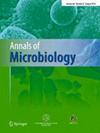SCFA 对热应激大鼠器官损伤和肠道微生物群调节的保护作用
IF 3
4区 生物学
Q2 BIOTECHNOLOGY & APPLIED MICROBIOLOGY
引用次数: 0
摘要
本研究旨在探讨短链脂肪酸(SCFAs)在保护器官免受热应激诱发的损伤和调节肠道微生物群方面的潜力。将 Sprague-Dawley 大鼠随机分配到不同的组别,包括对照组、常温训练组、高温训练组、SCFAs 预处理组和接受高温组粪便的受体组。高温剧烈训练后,评估血浆酶 AST、ALT、BUN 和 Cr 的水平。采用 16S rRNA 测序和 GC-MS 方法检测了肠道微生物群和粪便代谢物的变化。对结肠和肝脏组织进行了病理学检查,并采用免疫组化技术评估肠道屏障功能。研究结果表明,SCFAs 有可能减轻热应激对肝脏和结肠造成的损伤。在 SCFAs 的干预下,肠道微生物群的结构和代谢物发生了明显变化,肠道屏障功能也有所改善。粪便微生物群移植进一步证实了 SCFAs 的益处,该移植证明,改变肠道微生物群可有效减少器官损伤。这项研究提供的证据表明,SCFAs 作为肠道微生物群的代谢产物,在调节肠道健康和减轻热应激的有害影响方面具有重要作用。本文章由计算机程序翻译,如有差异,请以英文原文为准。
Protective effects of SCFAs on organ injury and gut microbiota modulation in heat-stressed rats
This research was conducted to investigate the potential of short-chain fatty acids (SCFAs) in protecting organs from heat stress-induced injuries and gut microbiota modulation. Sprague–Dawley rats were randomly assigned to various groups including a control group, a room temperature training group, a hyperthermia training group, SCFAs pretreatment group, and recipients received feces from the HT group. After strenuous training at high temperatures, the levels of plasma enzymes AST, ALT, BUN, and Cr were evaluated. The changes in gut microbiota and fecal metabolites were detected using 16S rRNA sequencing and GC–MS methods. Pathological examination of colon and liver tissues was conducted, and immunohistochemical techniques were employed to assess intestinal barrier function. The findings indicate that SCFAs hold the potential for mitigating liver and colon damage caused by heat stress. With the intervention of SCFAs, there were observable changes in the structure and metabolites of the intestinal microbiota, as well as improvements in intestinal barrier function. Further support for the benefits of SCFAs was found through fecal microbiota transplantation, which demonstrated that modified gut microbiota can effectively reduce organ damage. This study provides evidence that SCFAs, as metabolites of the gut microbiota, have a valuable role to play in regulating gut health and mitigating the harmful effects of heat stress.
求助全文
通过发布文献求助,成功后即可免费获取论文全文。
去求助
来源期刊

Annals of Microbiology
生物-生物工程与应用微生物
CiteScore
6.40
自引率
0.00%
发文量
41
审稿时长
3.2 months
期刊介绍:
Annals of Microbiology covers these fields of fundamental and applied microbiology:
general, environmental, food, agricultural, industrial, ecology, soil, water, air and biodeterioration.
The journal’s scope does not include medical microbiology or phytopathological microbiology.
Papers reporting work on bacteria, fungi, microalgae, and bacteriophages are welcome.
Annals of Microbiology publishes Review Articles, Original Articles, Short Communications, and Editorials.
Originally founded as Annali Di Microbiologia Ed Enzimologia in 1940, Annals of Microbiology is an official journal of the University of Milan.
 求助内容:
求助内容: 应助结果提醒方式:
应助结果提醒方式:


